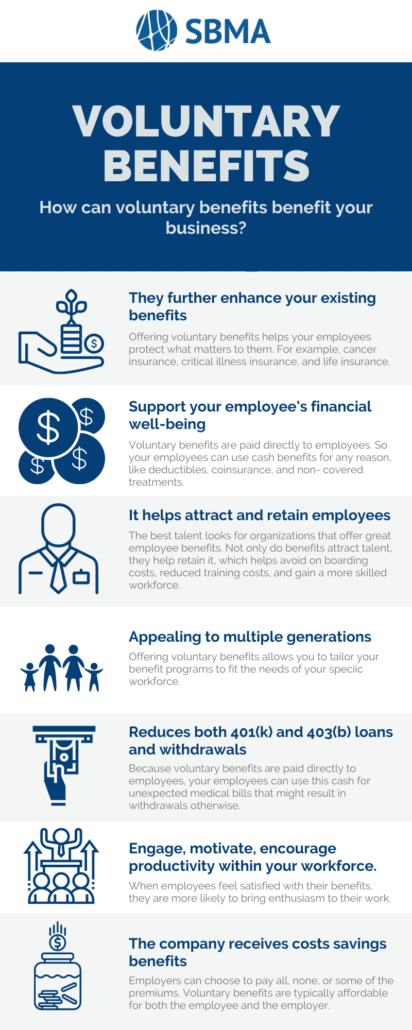Benefit programs are essential to keeping your employees engaged and happy at work— but not just standard benefit programs. You also need to provide voluntary benefits.
Voluntary benefits allow employees to feel cared for and important in your organization. And satisfied employees lead to productive work environments and increased profits.
Keep reading for more information on voluntary benefits and how they can benefit both your business and your employees!
What Are Voluntary Benefits?
Voluntary benefits are employer-sponsored benefit programs that employees can choose to participate in. They are typically offered in addition to the standard benefits package, which usually includes health insurance and retirement savings plans.
Some examples of voluntary benefits include:
- Dental and vision insurance
- Life insurance
- Flexible spending accounts
- Disability insurance
- Child care assistance
- Tuition reimbursement
Voluntary benefits can be both personal and financial in nature.
Learn more about the differences between voluntary and individual benefits, here.
What Are the Advantages of Offering Voluntary Benefits?
Offering voluntary benefits has many advantages for both employers and employees. For employers, it shows that you value your employees and are committed to providing them with the best possible benefits package. It also helps attract and retain top talent.
Employees appreciate being able to choose their own benefits, as it allows them to tailor the package to their specific needs. Voluntary benefits can also lead to increased employee satisfaction and productivity.
Key Ways Your Business Can Benefit
These benefits can:
- Enhance your existing benefits: Offering voluntary benefits helps your employees protect what matters most to them. For example, cancer insurance, critical illness insurance, and life insurance all contribute to employees feeling safe and secure in their health.
- Support your employee’s financial well-being: Voluntary benefits are paid directly to employees. Your employees can use cash benefits for any reason, like deductibles, coinsurance, and non-covered treatments.
- Help attract and retain employees: The best talent looks for organizations that offer great employee benefits. Not only do benefits attract talent, they help retain it. And that can relieve onboarding costs, reduce training costs, and contribute to a more skilled workforce.
- Appeal to multiple generations: Offering voluntary benefits allows you to tailor your benefits programs to fit the needs of your specific workforce.
- Reduce both 401(k) and 403(b) loans and withdrawals: Because voluntary benefits are paid directly to employees, your employees can use this cash for unexpected medical bills that might result in withdrawals otherwise.
- Engage, motivate, and encourage productivity within your workforce: When employees feel satisfied with their benefits, they are more likely to bring enthusiasm to their work. This satisfaction can also reduce absences and tardiness, as well as increase employee loyalty to their company.
The company also receives cost-savings benefits. Employers can choose to pay all, none, or some of the premiums. Voluntary benefits are typically affordable for both the employee and the employers.
What Are Some Things to Consider When Offering Voluntary Benefits?
When offering voluntary benefits, there are a few things to keep in mind.
- First, you’ll want to make sure that you offer a variety of benefits so that employees can find something that suits their needs.
- Second, you’ll want to make sure that your benefits are affordable for both you and your employees.
- Finally, you’ll want to make sure that you communicate the details of the benefits package clearly so that employees understand what is available to them.
It’s also good to keep in mind that, as the employee population becomes increasingly diverse, so too will the preferences for and take-up of voluntary benefits. As a result, it is important for employers to stay up-to-date on the latest trends and offerings in order to meet the needs of their employees.
How Can I Offer Voluntary Benefits To My Employees?
There are a few different ways that employers can offer voluntary benefits to their employees:
- Direct purchase: Employees can purchase voluntary benefits directly from the insurance company.
- Employer-sponsored plan: Employees can purchase voluntary benefits through an employer-sponsored plan.
- Salary deduction: Employees can have the cost of their voluntary benefits deducted from their paycheck.
No matter how you choose to offer voluntary benefits, be sure to communicate the available options to your employees. They’ll appreciate knowing that you care about their well-being and are invested in their happiness at work.
Final Thoughts
Voluntary benefits are a great way to show your employees that you care about their well-being. By offering these benefits, you can attract and retain top talent, increase employee satisfaction, and boost productivity. Keep these things in mind when considering voluntary benefits for your business!
At SBMA, we understand how important your employees are to your company. Contact us to learn more about how voluntary benefits can help your business.



